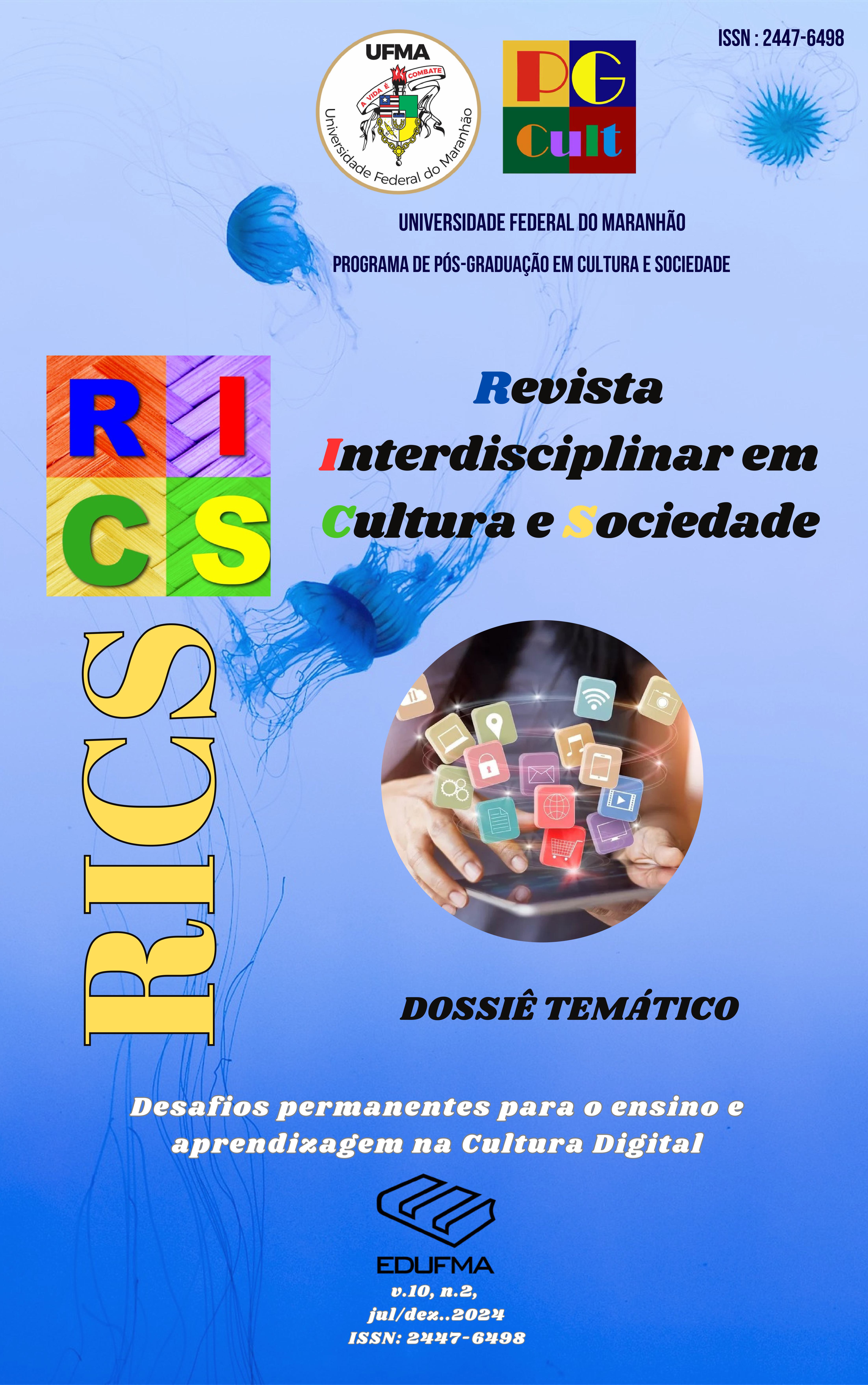Educação digital e vídeos: reflexões sobre formatos e influências da cibercultura
DOI:
https://doi.org/10.18764/2447-6498.v10n2.2024.17Palavras-chave:
vídeo educacionais, cibercultura, inteligência artificial (IA), formatos, transformação digital, educação digitalResumo
O artigo aborda o impacto da cibercultura no uso de vídeos educacionais no contexto da educação digital, considerando os formatos de vídeos e como foram evoluindo ao longo do tempo. Por meio de uma revisão narrativa da literatura, o estudo enfatiza aspectos como a inteligência coletiva, a cocriação e o caráter dinâmico das mídias digitais. Além de elencar as estratégias e fatores que afetam a produção de vídeos, como: a escolha entre formatos síncronos e assíncronos, a personalização do conteúdo, e o impacto da inteligência artificial na automatização de processos. Conclui-se que, embora os vídeos desempenhem um papel essencial no ambiente digital, sua eficácia depende do equilíbrio entre o uso da tecnologia e da mediação entre professores e estudantes, aproveitando as oportunidades trazidas pela cibercultura, sem perder de vista as particularidades do processo educacional na educação digital.
Downloads
Referências
Brasil. Conselho Nacional de Educação (CNE). Portaria MEC nº 343, de 17 de março de 2020, Brasília, BR. 2020.
Cattaneo, A.; P. Jong, Frank De; Ramos, J. L.; Laitinen-Väänänen, Sirpa; Pedaste, Margus; Leijen, Äli; Evi-Colombo, Alessia; Monginho, Ricardo; Bent, Marije; Velasquez-Godinez, Erick. Video-based collaborative learning: a pedagogical model and instructional design tool emerging from an international multiple case study. European Journal Of Teacher Education, [S.L.], p. 1-25. Informa UK Limited. 2022. DOI: http://dx.doi.org/10.1080/02619768.2022.2086859.
Chorianopoulos, K. A Taxonomy of Asynchronous Instructional Video Styles. The International Review Of Research. Open And Distributed Learning, [S.L.], v. 19, n. 1, p. 01-17, 23 fev. 2018. Athabasca University Press. 2018. DOI: http://dx.doi.org/10.19173/irrodl.v19i1.2920.
Educause Horizon Report. Teaching and Learning Edition. Boulder: CO. 2023.
Ferrari, R. Writing narrative style literature reviews. Medical Writing, 24(4), 230-235. 2015. DOI: https://doi.org/10.1179/2047480615Z.000000000329
Fontes, A. J.; Pereira, N. L.; Souza, M. V. de. Panorama sobre o termo educação digital: uma análise bibliométrica (2019-2022) no cenário da transformação digital. Perspectivas em Engenharia, Mídias e Gestão do Conhecimento, Vol. 3. Editora Arquétipos. 2023. Disponível em: https://editoraarquetipos.com.br/produto/perspectivas-em-engenharia-midias-e-gestao-do-conhecimento-volume-4-2/. Acesso 20/09/2024.
LÉVY, Pierre. Cibercultura. (Trad. Carlos Irineu da Costa). São Paulo: Editora 34, 2009.
Reis, I. W.; Cordeiro, W; Berg, C. H.. Ulbricht, V. R. Espaços criativos na educação a distância: uma revisão sistemática. IN: Anais.. XIII Congresso Internacional de Conhecimento e Inovação (ciKi). Florianópolis, SC. 2023.
Morán, J. M. O vídeo na sala de aula. Comunicação & Educação, [S.L.], n. 2, p. 27. Universidade de São Paulo, Agencia USP de Gestão da Informação Acadêmica (AGUIA). 1995.
Vital-Rumebe G.; Irma, L.; Ontiveros-Moreno.; Claudia, G.; Guerra-Rojas.; Alfonso, Gutiérrez-Rocha. Videoaprendizagem: aprendizagem e educação através de meios audiovisuais, desde uma perspectiva histórica e contemporânea. Revista Pan-Americana de Pedagogia. (32).5.2021. DOI: 10.21555/RPP.V0I32.2272
Hansch, A.; Hillers, L.; M., Katherine; Newman, C.; Schildhauer, T.; Schmidt, P. Video and Online Learning: critical reflections and findings from the field. Ssrn Electronic Journal, [S.L.], p. 12-34. Elsevier BV. 2015. DOI: http://dx.doi.org/10.2139/ssrn.2577882
Hjorth, W. R. Vídeos instrucionais TechTrends. 67, 215–216. 2023. DOI: https://doi-org.ez46.periodicos.capes.gov.br/10.1007/s11528-023-00836-y
Pacheco, R. C. dos S.; Santos, N. dos; Wahrhaftig, R. Transformação digital na Educação Superior: modos e impactos na universidade. Revista Nupem, [S.L.], v. 12, n. 27, p. 94-128, 14 dez. 2020. Universidade Estadual do Paraná - Unespar. 2020.
Waldman, R.; Zambrano, V.; Ronha, A. N. Erosão do ciberespaço e da cibercultura na privacidade a luz das teorias de Pierre Levy e Manuel Castells. Revista Direito Mackenzie. v. 17 n. 1. 2023.
Silva, R. M. da. A Trajetória do Programa Telecurso e o monopólio das Organizações Globo no Âmbito do tele-ensino no Brasil. InterMeio: Revista Do Programa De Pós-Graduação Em Educação - UFMS, 19(38). 2016. DOI: https://periodicos.ufms.br/index.php/intm/article/view/2357
Tasker, Y. Genre in Action: The Impossibility and Value of Genre Analysis. In: Ritzer, I. (eds) Media and Genre. Palgrave Macmillan, Cham. 2022. DOI: https://doi.org/10.1007/978-3-030-69866-9_2
Downloads
Publicado
Como Citar
Edição
Seção
Licença
Copyright (c) 2024 Revista Interdisciplinar em Cultura e Sociedade

Este trabalho está licenciado sob uma licença Creative Commons Attribution 4.0 International License.

Este trabalho está licenciado com uma Licença Creative Commons Atribuição 4.0 Internacional. Os autores da Revista Interdisciplinar em Cultura e Sociedade mantêm os direitos autorais.


















